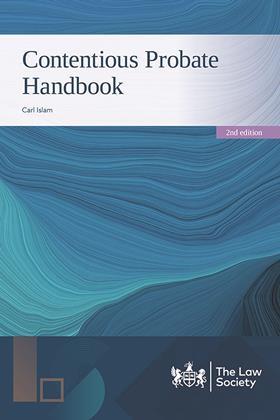Contentious Probate Handbook
Carl Islam
£110, The Law Society
★★★★✩
This is essential reading for all aspiring contentious probate practitioners. It is also a useful manual which experienced solicitors may refer to during complex claims. It is well-stocked with relevant references to up-to-date decisions, featuring useful extracts from leading judgments and statutory instruments, such as the Chancery Guide 2022.
Islam takes the reader on a journey from the first meeting with a client looking to bring a probate claim, through the process of investigating the facts and obtaining evidence, the pre-action exchanges, and the full court process up to trial and beyond. The concluding two chapters of this very detailed and instructive manual serve as an excellent guide to the most common forms of alternative dispute resolution. There is a large emphasis on mediation (very useful to mediators as well as parties’ representatives), and on how to structure settlements to ensure tax efficiency. The appendices include some useful precedents and a more detailed guide to psychiatric disorders which may affect testamentary capacity.

Some sections are especially detailed, in particular those exploring challenges based on lack of testamentary capacity (chapter 3.3) and want of knowledge and approval (3.4), which draw on considerable authority and provide very helpful analysis. Other sections, such as the early processes of obtaining estate documents from unwilling parties (chapter 2), or the process involved in seeking the court’s approval of a settlement affecting the interests of a minor (visited briefly at 7.3.3), are rather brief, however.
Although chapter 4 does briefly look at associated and alternative claims, these are beyond the scope of the text. There is therefore limited (although still very useful) consideration of the Inheritance (Provision for Family and Dependants) Act 1975 and estoppel actions. Chapter 4, however, does helpfully contain a thorough explanation of the parameters of will rectification claims.
No litigation text would be complete without examining costs. In chapter 6, Islam analyses how principles established in wider civil litigation may apply to probate claims. The book also considers the Hirachand appeal (which provided that success fees in CFAs may not be awarded from an estate in 1975 act claims), and more recent amendments to various parts of the Civil Procedure Rules 1998 which have elevated the court’s emphasis on ADR.
In summary, this book is a vitally important source of both reference and analysis.
Lewis Hastie is director of contentious probate at BRM Solicitors Limited, Sheffield































No comments yet